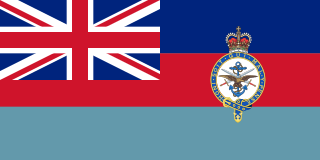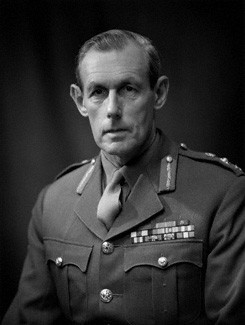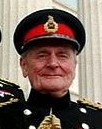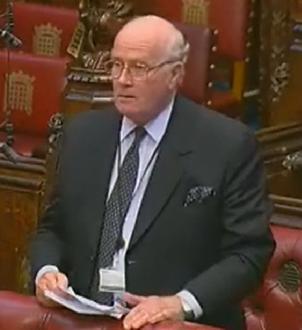Edwin Bramall
Last updatedThe Lord Bramall | |
|---|---|
 Bramall in 2005 | |
| Birth name | Edwin Noel Westby Bramall |
| Born | 18 December 1923 Tonbridge, Kent, England |
| Died | 12 November 2019 (aged 95) |
| Allegiance | United Kingdom |
| Service/ | British Army |
| Years of service | 1942–1985 |
| Rank | Field Marshal |
| Service number | 277408 |
| Unit | King's Royal Rifle Corps Royal Green Jackets |
| Commands held | Chief of the Defence Staff Chief of the General Staff Land Forces British Forces in Hong Kong 1st Division 5th (Airportable) Infantry Brigade 2nd Battalion Royal Green Jackets |
| Battles/wars | Second World War Indonesia–Malaysia confrontation Falklands War |
| Awards | Knight Companion of the Order of the Garter Knight Grand Cross of the Order of the Bath Officer of the Order of the British Empire Military Cross Knight of the Order of St John Mentioned in despatches |
Field Marshal Edwin Noel Westby Bramall, Baron Bramall, KG , GCB , OBE , MC , JP , DL (18 December 1923 – 12 November 2019) was a British Army officer. He served as Chief of the General Staff, the professional head of the British Army, between 1979 and 1982, and as Chief of the Defence Staff, professional head of the British Armed Forces, from 1982 to 1985.
Contents
Early life and family
Bramall was born on 18 December 1923 in Tonbridge, Kent, England, the son of Major Edmund Haselden Bramall (1889−1964) (son of Ernest Edward Bramall (1864–1938), managing director of Desford Colliery, Leicester) [1] by his wife Katherine Bridget Westby. [2] He was educated at Eton College, [3] where, among other accomplishments, he captained an undefeated first XI cricket team. [4]
In 1949 he married Dorothy Avril Wentworth Vernon, by whom he had one son and one daughter. [2] His elder brother Ashley Bramall was a barrister, Labour politician and Leader of the Inner London Education Authority. [5]
Military career
Bramall was commissioned as a second lieutenant in the King's Royal Rifle Corps on 22 May 1943, during the Second World War. [6] He took part in the Normandy landings in June 1944 [3] and served with the 2nd Battalion of his regiment in Northwest Europe during the later stages of the war, receiving the Military Cross on 1 March 1945, shortly before the end of World War II in Europe. [7]
Bramall was promoted to lieutenant on 18 June 1946 [8] and served in the occupation of Japan from 1946, before becoming an instructor at the School of Infantry in 1949. [2] Promoted to captain on 18 December 1950, [9] he was stationed in the Middle East from 1953 [10] and was then promoted to major on 18 December 1957. [11] Continuing his military career, he served two years as an instructor at the Staff College, Camberley, from 1958, and then was appointed to serve on Lord Mountbatten's staff in 1963. [10]

Appointed an Officer of the Order of the British Empire in the 1965 New Year Honours, [12] and promoted to lieutenant colonel on 25 January 1965, [13] he was appointed Commanding Officer of the 2nd Green Jackets, The King's Royal Rifle Corps: the Battalion was deployed to Borneo during the Indonesia–Malaysia confrontation in the first half of 1966 where his actions earned him a mention in despatches. [14] He was given command of the 5th (Airportable) Infantry Brigade in November 1967 [15] with promotion to brigadier on 31 December 1967. [16]
Bramall was made General Officer Commanding the 1st Division on 6 January 1972, [17] with the substantive rank of major general from 6 April 1972, [18] Commander of British Forces in Hong Kong with the rank of lieutenant general on 1 December 1973 [19] and appointed a Knight Commander of the Order of the Bath in the 1974 New Year Honours. [20] He went on to be Commander-in-Chief, UK Land Forces on 15 May 1976 [21] and was promoted to full general on 25 June 1976. [22]

He was appointed Vice-Chief of the Defence Staff (Personnel and Logistics) on 20 March 1978, [23] advanced to Knight Grand Cross of the Order of the Bath in the 1979 New Year Honours, [24] before being made ADC General to the Queen on 26 June 1979 [25] and appointed Chief of the General Staff on 14 July 1979. [26] In this role he strongly supported the plan in May 1982 to land troops at San Carlos Water and then advance rapidly from those positions at the early stages of the Falklands War. [15]
Bramall was promoted to field marshal on 1 August 1982, [27] and appointed Chief of the Defence Staff on 1 October that year. [28] In this capacity he developed the concept of the "Fifth Pillar" pulling together the activities of defence attachés to form a structure for intervention in smaller countries. [3] He retired in November 1985. [15] He was also Colonel of the 3rd Battalion the Royal Green Jackets from December 1973, Colonel of the 2nd King Edward VII's Own Gurkha Rifles (The Sirmoor Rifles) from 14 September 1976 [29] and Colonel Commandant of the Special Air Service from 19 May 1985. [30]
Later career

Following his retirement from active military duty Bramall served as Lord Lieutenant of Greater London from 1986 [31] to 1998. [2] He was invested as a Knight Companion of the Garter in 1990. [32] He served as President of the Marylebone Cricket Club (MCC) in 1988. [33] [34] and was an Honorary Life Vice President of the MCC. [35] His other interests included painting and travel and he was a vice-president of the welfare organisation SSAFA Forces Help. [2]
Bramall was created a life peer as Baron Bramall of Bushfield in the County of Hampshire in 1987. [36] [37] Bramall spoke out in the House of Lords against the involvement of the United Kingdom in the Second Iraq War warning that "unlike naked aggression, terrorism cannot be defeated by massive military means" but by "competent protection and positive diplomacy". [38]
On 27 August 2006 it was reported that Bramall, then aged 82, hit Lord Janner, then 78, after Bramall made what witnesses claim were a series of "anti-Israel" comments during an argument over the Lebanon conflict. Janner sought the advice of fellow peers about how and whether to make a formal complaint against Bramall, before deciding to accept an apology after which Janner said the matter was resolved. [39]
On 25 April 2013 Bramall retired from service in the House of Lords. [40] He died at the age of 95 on 12 November 2019, at his home in Crondall, Hampshire [41] [42] [43]
Operation Midland
Bramall was one of several senior establishment figures targeted by convicted perjurer Carl Beech: following fabricated complaints made by Beech officers of the Metropolitan Police searched Bramall's home near Farnham on 4 March 2015 as part of the Operation Midland child sexual abuse investigation. [44] Bramall released a statement after the search, saying: "Categorically, never have I had a connection or anything to do with the matters being investigated." [45] On 30 April 2015, under the same investigation, Lord Bramall attended a police station in Surrey by appointment. While officers interviewed him for two hours, they did not charge or arrest him. [46]
On 15 January 2016, the police confirmed that there was insufficient evidence to bring any charges and he would face no further action. [47] Bramall's wife Lady Bramall died in July 2015, without knowing that he would not be charged. [48] In October 2016, after what The Guardian described as a "chorus of calls" for an official apology to Lord Bramall, [49] the Metropolitan Police Commissioner Sir Bernard Hogan-Howe apologised to Bramall. [50]
On 1 September 2017, it was reported that the Metropolitan Police had paid substantial compensation to Bramall for having raided his home "after accepting that the searches had been unjustified and should never have taken place." [51]
Beech was subsequently arrested and committed to stand trial on 12 counts of perverting the course of justice and one count of fraud in May 2019; he was convicted on all charges, and in July 2019 was sentenced to 18 years imprisonment. [52] The court was told that "immeasurable distress" had been caused to those falsely accused as well as "obvious reputational damage". [53] Bramall said of the ordeal: "I can honestly say however I was never as badly wounded in all my time in the military as I have been by the allegations made by [Beech] that formed the basis of Operation Midland." [54]
Arms
 |
|
Related Research Articles

Greville Ewan Janner, Baron Janner of Braunstone, was a British politician, barrister and writer. He became a Labour Party Member of Parliament for Leicester in the 1970 general election as a last-minute candidate, succeeding his father. He was an MP until 1997, and then elevated to the House of Lords. Never a frontbencher, Janner was particularly known for his work on Select Committees; he chaired the Select Committee on Employment for a time. He was associated with a number of Jewish organisations including the Board of Deputies of British Jews, of which he was chairman from 1978 to 1984, and was later prominent in the field of education about the Holocaust.

Admiral of the Fleet is a five-star naval officer rank and the highest rank of the Royal Navy, formally established in 1688. The five-star NATO rank code is OF-10, equivalent to a field marshal in the British Army or a Marshal of the Royal Air Force. Apart from honorary appointments, no new admirals of the fleet have been named since 1995, and no honorary appointments have been made since 2014.

Leon Brittan, Baron Brittan of Spennithorne, was a British Conservative politician and barrister who served as a European Commissioner from 1989 to 1999. As a member of Parliament from 1974 to 1988, he served several ministerial roles in Margaret Thatcher's government, including Home Secretary from 1983 to 1985.

Thomas Anthony Watson, Baron Watson of Wyre Forest is a British politician who served as Deputy Leader of the Labour Party from 2015 to 2019. A Member of the House of Lords since 2022, he was Member of Parliament (MP) for West Bromwich East from 2001 to 2019.

The Chief of the Defence Staff (CDS) is the professional head of the British Armed Forces and the most senior uniformed military adviser to the Secretary of State for Defence and the Prime Minister of the United Kingdom. The chief of the defence staff is based at the Ministry of Defence and works alongside the Permanent Under-Secretary of State for Defence, the ministry's senior civil servant. The Chief of Defence is the highest ranking officer to currently serve in the armed forces.

Keith Harvey Proctor is a British former Conservative Member of Parliament. A member of the Monday Club, he represented Basildon from 1979 to 1983 and Billericay from 1983 to 1987. Proctor became embroiled in a scandal involving sexual relationships with males under 21 which culminated in criminal convictions and ended his parliamentary career. He was later one of those accused by Carl Beech of being part of an abuse ring, something which Harvey utterly denied. In 2016, the investigations into Proctor concluded and found the accusations to be baseless. Proctor was subsequently paid £900,000 in compensation for victimization through the botched Operation Midland. His experience has seen him lead efforts to protect those in the public eye from unfair attacks by the media.

The Chief of the General Staff (CGS) has been the title of the professional head of the British Army since 1964. The CGS is a member of both the Chiefs of Staff Committee and the Army Board; he is also the Chair of the Executive Committee of the Army Board. Prior to 1964, the title was Chief of the Imperial General Staff (CIGS). Since 1959, the post has been immediately subordinate to the Chief of the Defence Staff, the post held by the professional head of the British Armed Forces.

Field Marshal Sir Geoffrey Harding Baker, was Chief of the General Staff, the professional head of the British Army, from 1968 to 1971. He served in the Second World War and became Director of Operations and Chief of Staff for the campaign against EOKA in Cyprus during the Cyprus Emergency and later in his career provided advice to the British Government on the deployment of troops to Northern Ireland at the start of the Troubles.

Field Marshal Richard Michael Power Carver, Baron Carver, was a senior British Army officer. Lord Carver served as the Chief of the General Staff (CGS), the professional head of the British Army, and then as the Chief of the Defence Staff (CDS), the professional head of the British Armed Forces. He served with distinction during the Second World War and organised the administration of British forces deployed in response to the Mau Mau Uprising in Kenya and later in his career provided advice to the British government on the response to the early stages of The Troubles in Northern Ireland.

Field Marshal Sir Roland Christopher Gibbs, was Chief of the General Staff, the professional head of the British Army, from 1976 to 1979, and Lord Lieutenant of Wiltshire from 1989 to 1996. He saw active service in the Second World War and acted as chief of staff to the commander of the operation to evacuate all British troops and civilians from Aden during the Aden Emergency.
Field Marshal Peter Anthony Inge, Baron Inge, was a senior British Army officer. He was the Chief of the General Staff, the professional head of the British Army, from 1992 to 1994 and then served as Chief of the Defence Staff before retiring in 1997. Early in his military career he saw action during the Malayan Emergency and Operation Banner in Northern Ireland, and later in his career he provided advice to the British Government during the Bosnian War.

Field Marshal Michael John Dawson Walker, Baron Walker of Aldringham, is a retired British Army officer. Commissioned in 1966, he served in Cyprus, Northern Ireland, and in a variety of staff posts in the United Kingdom until 1984. After being given command of a battalion, he was mentioned in despatches for his service during a second tour of duty in Northern Ireland, this time in Derry, and subsequently served a tour on Gibraltar. He was promoted to brigadier, unusually having never held the rank of colonel, and took command of 20th Armoured Brigade in Germany before becoming I Corps chief of staff.

Field Marshal Richard Frederick Vincent, Baron Vincent of Coleshill, was a British Army officer. After serving with British Army of the Rhine he served with the Commonwealth Brigade in Malaysia during the Indonesia–Malaysia confrontation. He commanded 12th Light Air Defence Regiment in Northern Ireland during the Troubles, for which he was appointed a Companion of the Distinguished Service Order, and later commanded 19th Airportable Brigade. Although he never served as one of the individual service heads, he went on to be Vice-Chief of the Defence Staff in the late 1980s and then Chief of the Defence Staff in the aftermath of the Gulf War. He subsequently became Chair of the Military Committee of NATO in the mid-1990s.

Field Marshal George Francis Milne, 1st Baron Milne, was a senior British Army officer who served as Chief of the Imperial General Staff (CIGS) from 1926 to 1933. He served in the Second Boer War and during the First World War he served briefly on the Western Front but spent most of the war commanding the British forces on the Macedonian front. As CIGS he generally promoted the mechanisation of British land forces although limited practical progress was made during his term in office.

Bernard Hogan-Howe, Baron Hogan-Howe, is an English former police officer and was the head of London's Metropolitan Police as Commissioner of Police of the Metropolis from 2011 until 2017.

Field marshal (FM) has been the highest rank in the British Army since 1736. A five-star rank with NATO code OF-10, it is equivalent to an Admiral of the Fleet in the Royal Navy or a Marshal of the Royal Air Force in the Royal Air Force (RAF). A Field Marshal's insignia consists of two crossed batons surrounded by yellow leaves below the Tudor Crown. Like Marshals of the Royal Air Force and Admirals of the Fleet, Field Marshals traditionally remain officers for life, though on half-pay when not in an appointment or retired. The rank has been used sporadically throughout its history, and was vacant during parts of the 18th and 19th centuries. After the Second World War, it became standard practice to appoint the Chief of the Imperial General Staff to the rank on his last day in the post. Army officers occupying the post of Chief of the Defence Staff, the professional head of all the British Armed Forces, were usually promoted to the rank upon their appointment.
Exaro or Exaro News was a British website based in London between 2011 and 2016. It purportedly undertook political investigative journalism, but is now primarily known for its direct involvement in the false allegations of sexual abuse put forward by "Nick" in Operation Midland.
The Elm Guest House was a hotel in Rocks Lane, near Barnes Common in southwest London. In a list produced by convicted fraudster Chris Fay, several prominent British men were alleged to have engaged in sexual abuse and child grooming at the Guest House in the late 1970s and early 1980s. Labour MP Tom Watson, having heard testimony from Carl Beech, suggested in an October 2012 statement to the House of Commons that a paedophile network which had existed at this time may have brought children to parties at the private residence.

Operation Midland was a criminal investigation which the London Metropolitan Police carried out between November 2014 and March 2016 in response to false allegations of historic child abuse made by Carl Beech.
Michael Veale was the Chief Constable of Cleveland Police in northeast England until his resignation in January 2019. From 2015 until 2018 he was Chief Constable of Wiltshire Police, the force responsible for policing Wiltshire and Swindon in the southwest of England. He came to national prominence in 2017 when Wiltshire Police presented the findings of its investigation into alleged sexual abuse by former prime minister Edward Heath.
References
- ↑ Obituary, The Times, 1 September 1938. page 1 col A
- 1 2 3 4 5 Who's Who 2010, A & C Black, 2010, ISBN 978-1-4081-1414-8
- 1 2 3 Heathcote 1999, p. 53.
- ↑ Allan Mallinson (16 December 2017). "Wise Old Warhorse". Spectator. Retrieved 11 August 2023.
- ↑ "Field Marshal The Lord Bramall of Bushfield". Royal Green Jackets Association. Archived from the original on 26 April 2012. Retrieved 24 December 2011.
- ↑ "No. 36074". The London Gazette (Supplement). 29 June 1943. p. 2980.
- ↑ "No. 36961". The London Gazette (Supplement). 27 February 1945. p. 1176.
- ↑ "No. 37698". The London Gazette (Supplement). 20 August 1946. p. 4238.
- ↑ "No. 39093". The London Gazette (Supplement). 19 December 1950. p. 6320.
- 1 2 Heathcote 1999, p. 54.
- ↑ "No. 41254". The London Gazette (Supplement). 13 December 1957. p. 7346.
- ↑ "No. 43529". The London Gazette (Supplement). 29 December 1964. p. 6.
- ↑ "No. 43682". The London Gazette (Supplement). 11 June 1965. p. 5687.
- ↑ "No. 44196". The London Gazette (Supplement). 9 December 1966. p. 13461.
- 1 2 3 Heathcote 1999, p. 55.
- ↑ "No. 44493". The London Gazette (Supplement). 29 December 1967. p. 74.
- ↑ "No. 45569". The London Gazette (Supplement). 10 January 1972. p. 347.
- ↑ "No. 45641". The London Gazette (Supplement). 10 April 1972. p. 4283.
- ↑ "No. 46143". The London Gazette (Supplement). 3 December 1973. p. 14387.
- ↑ "No. 46162". The London Gazette (Supplement). 28 December 1973. p. 2.
- ↑ "No. 46901". The London Gazette (Supplement). 17 May 1976. p. 7063.
- ↑ "No. 46947". The London Gazette (Supplement). 28 June 1976. p. 8989.
- ↑ "No. 47493". The London Gazette (Supplement). 20 March 1978. p. 3563.
